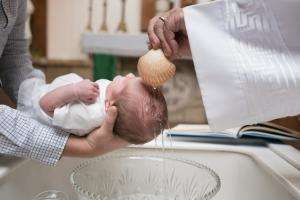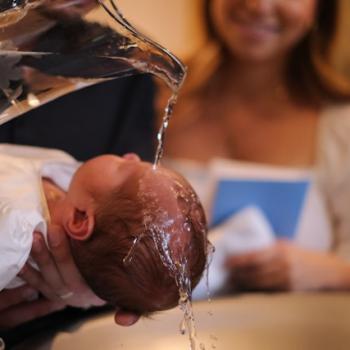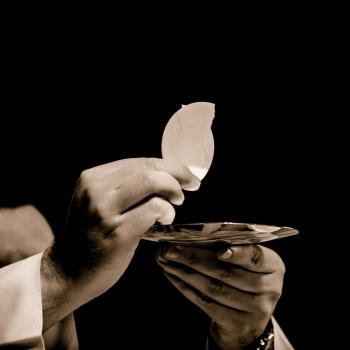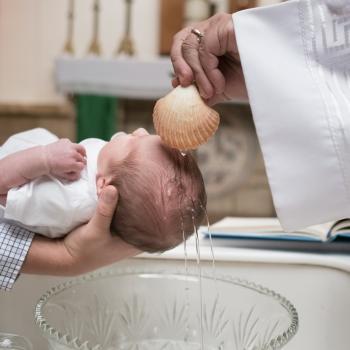Photo by Josh Applegate on Unsplash
This sermon was preached at the baptism of my granddaughter, Ellie Lynn Lacey on Sunday, June 18, 2023.
As many of you know – because I have told you over and over again – today, we will be baptizing my granddaughter, Ellie Lynn. The only excuse I have to offer is the that I I am no different in this regard from any other grandfather. As Ogden Nash once observed, “When a grandparent enters the door, discipline flies out the window.”
But I would like to draw on the perspective of grandfather and priest this morning to make a few observations that might not have occurred to me some years ago. And my hope is that you might catch a glimpse of why an occasion like this could be important to you – not just as parents and grandparents, but as members of the body of Christ.
First, I’d like to observe just how important families are – to our identity, to our self-understanding, and to our well-being. We don’t comment on this fact very often. In part, because our culture places an inordinate emphasis on the individual. The emphasis on the individual has become such a powerful force in the modern world that it not only shapes the way in which we think about our lives, it is rewriting the future.
The extended family is fragile entity that is celebrated in the breach than its practice. We have professionalized the care of the elderly. We have outsourced the rearing of our children. And, even the birth rate has dropped precipitously in the developing world. As one recent article observes,
The number of babies born in the U.S. started plummeting 15 years ago and hasn’t recovered since. What looked at first like a temporary lull triggered by the 2008 financial crisis has stretched into a prolonged fertility downturn. Provisional monthly figures show that there were about 3.66 million babies born in the U.S. last year, a decline of 15% since 2007, even though there are 9% more women in their prime childbearing years.
As a result, observers here and in Europe are increasingly concerned that we have built a society which future generations will find it impossible to sustain.
But we also miss the importance of the family in our lives because we have become so thoroughly political in our outlook that government has assumed a quasi-parental role in our lives. Setting aside party politics where there are some differences, the fact of the matter is that Americans in general rely on the government and other institutions to enforce values and address life’s challenges along a growing frontier of what we imagine government should do.
Even Christians imbue their faith with so much political baggage that government, not God, appears to reign supreme and the Kingdom of God is reinterpreted as some form of political order. Much to the consternation of my friends on both ends of the political spectrum I have argued more than once that there is not just one form of Christian nationalism in the United States but two – one on the right and one on the left.
The prominence of the family in both the Old and New Testaments is a striking contrast to all of this.
Scripture begins the human journey with a family. Human history is encapsulated in the story of Adam and Eve, the first husband and wife. The gifts we are given are captured by their story. The spiritual peril we face is described in the story of the disobedience. The dreadful consequences of being our own god is revealed in Cain’s murder of Abel.
The story of God’s redeeming love and his quest to heal our wounded nature is worked out in promises made to the families of Abraham, Isaac, and Jacob. The nation of Israel is nothing more than one layer of family upon another, and the Savior God sends is raised up in a family with deep roots in the House of David. Even the Trinity itself is described in familial and relational terms.
The prominence of the family, then, as both the object and the vehicle of God’s redeeming love is not accidental, and we should pay attention to the pattern. It is the family in which our identities take shape. It is the family in which our understanding of what it means to be men and women is preserved and deepened across generations. And it is the family that transcends borders and cultural traditions.
More importantly, at their best families mirror the nurturing love of God. A mother’s love affirms that it is good that the child is. The father’s love pronounces a blessing on the child’s future. And, together, they live into the love of God.
But that bond is not just about affection. It is about a particular understanding of creation, of what it means to be a human being, of what true love and regard for others entails, of our moral obligation to the poor, the necessity of resisting evil, the indispensable truth of the Gospel, and the key to all wisdom: “There is a God and we are not.”
It shouldn’t surprise us, then, that the early church baptized infants or that we follow their lead. Nor should it surprise us that the baptismal vows cover all this ground, including the Nicene Creed. It would be strange, to say the least, for parents to experience the love of God and then deprive their own children of participation in that same life of love.
What parent, in their right mind, would be given what Jesus calls “the pearl of great price”, and then leave their child to stumble blindly through the thousands of counterfeits that the world offers? It makes no more sense to leave our children adrift spiritually to “make up their own minds” than it does to leave them on their own at a busy intersection to figure out how to make it safely from one side of the road to the other.
Yes, in time our children and grandchildren will make own choices, and, yes, those choices may dissent from ours and their choices may expose them to jeopardy. But it is malpractice to leave them without a grounding in the truth of the Gospel. And if we make material provision for their educations, teaching them how to navigate the world, keep themselves safe, and provide for themselves but then fail to raise them in the faith of Christ’s church, then we contribute to their jeopardy. We also say volumes about how unserious we are about our own faith.
It is this observation that brings me back to my role as father and grandfather – not just as a priest. In preparing for this day, it occurred to me that – thanks to the time I spent in the academy – this will be only the third baptism I have ever performed, and the last baptism was Ellie Lynn’s mother.
When I performed that baptism, I was confident that I would be around for most of her mother’s life, and I was reasonably sure that I could protect her. That wasn’t true, of course, and it was naïve of me to think that way. And – if you are thinking about your children’s well-being in that way – let me gently suggest that you are being pretty naïve as well. Life in suburban America has a way of anaestitizing us to the challenges our children will face, all the while pedaling half-truths and habits that are soul destroying.
But thirty some-odd years later, one of the more poignant realizations that has been whispering from the edges of what is a truly happy experience is that I will be fortunate to see Ellie Lynn graduate from high school. I will be honest with you: In my less hopeful moments, I worry about her.
Not because I don’t believe her parents won’t be good parents. They are. Not because I don’t believe that they won’t watch over her and prepare her for life. They are already doing that. I worry because I believe we are on the cusp of a time filled with new dangers for our country and for the world’s future.
Our leaders are absorbed with an intractable, partisan battle that is more about the past than the future. A post-modern Gnosticism has made inroads into both our intellectual and spiritual life that makes Pontius Pilate’s question, “What is truth?”, look like a sincere inquiry. And not even the hard sciences and mathematics are safe from the corrosive argument that the individual’s experience is the measure of what is true.
There are those who conclude that having children at all is a mistake but I don’t believe that. To have children, to have them baptized is a decision to trust God – to enter into the life God has entrusted to us – to share our lives and our faith with our children- to reach out into the future that God promises. This world was never our creation, yet having children challenges us, blesses us, and lifts our eyes to a horizon beyond our own narrow concerns.
Our concerns and misgivings should throw us back on the only certain thing any generation can have. That is the knowledge that on the day of their baptisms, our children are “sealed by the Holy Spirit in Baptism and marked as Christ’s own forever.”
Why do I say this? Because that conviction is at the heart of the Christian faith. God created us, God longs to dwell with us, and despite the chaos that has disrupted that relationship God offers himself in every generation. And as mothers, fathers, grandmothers, and grandfathers should know, there is no refuge more reliable than that.













